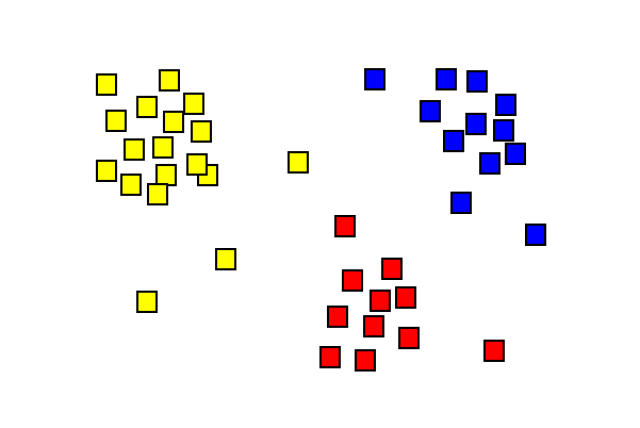Voting
Voting System
- Given Individual preferences
- Construct Social preference
- Example: Majority Outcome

Individual Preferences









>
>
>
>
>
>
>
>
>
>
>
>
X:
X:
Y:
Y:
Z:
Z:
Individual Preferences









>
>
>
>
>
>
>
>
>
>
>
>
X:
X:
Y:
Y:
Z:
Z:
Individual Preferences









>
>
>
>
>
>
>
>
>
>
>
>
X:
X:
Y:
Y:
Z:
Z:
Societal Preference




>
>
>
>

>
>

, Right?
Individual Preferences









>
>
>
>
>
>
>
>
>
>
>
>
X:
X:
Y:
Y:
Z:
Z:
Condorcet's Paradox
- Not really the first guy to notice
- Pairwise breaks transitivity
- Transitivity is pretty reasonable



Can we do better?
What do we want?
- Transitive
- Unanimous
- No dictators
- Independence of Irrelevant Alternatives
\}
}
Pretty reasonable
- Independence of Irrelevant Alternatives
???
1992 election
- Plurality - Candidate with the most votes wins
- Bush vs. Perot vs. Clinton
43%
19%
38%
IIA (Independence ... )
- A vs. B should not depend on A vs. C or B vs. C
- Bush would have won with Perot's votes
- Violates IIA; Clinton > Bush regardless of Perot
- Perot = Spoiler
Systems we looked at
- Majority: Candidate that is preferred over every other candidate wins.
- Plurality: Candidate with the most votes wins.
40%
X
Y
Z
35%
Y
Z
X
25%
Z
Y
X
40%
X
Y
Z
35%
Y
Z
X
25%
Z
Y
X
Plurality
X wins, because X has the highest number of votes putting him as the first choice
40%
X
Y
Z
35%
Y
Z
X
25%
Z
Y
X
Majority
Y wins
(40+35 = 75)% put Y over Z
(35+25 = 60)% put Y over X
Which is right?
Neither
What do we want?
- Transitive
- Unanimous
- No dictators
- Independence of Irrelevant Alternatives
Majority Rule
Plurality
Is it even possible?
- Given the axioms, no system satisfies all of them
- Proof shows that dictator exists

"LOL, nope!"
The catch
- Only applies to ranked systems
- Too restrictive
- Arrow thought that cardinal utility was too fuzzy
- Range voting

So?
- In practice, Majority Rule works reasonably well
- Situations that violate transitivity are fairly rare, IRL
- 2000 election:
- Nader - left wing
- Bush - right wing
- Al Gore - Somewhere in the middle
- Bush > Nader > Gore
- Nader > Bush > Gore
- P. Dasgupta and E. Maskin, “On the Robustness of Majority Rule”
\}
}
Pretty Unlikely
Voting Methods
- Wikipedia suggest a LOT:
- Highest averages
- D'Hondt
- Sainte Lague
- ...
- Mapping methods to situations = Open Problem
- Vote?
Collaborative Filtering
- Recommendation systems (Netflix, Amazon)
- You like things that others like you like
- Start with a set of assumptions about the CF algorithm:
- Following Arrow's reasoning, your preferences depend only on one other user (dictatorship)
- Nearest neighbor
- Weaken demands, you get weighted average, used in practice.
CF Axioms
- Universal property: Always output a rating
- Unanimity
- IIA: Rating of "Frozen" shouldn't depend on rating of "Toy Story" or "Cars"
- Scale Invariance: If the original rating of an item by user is , then replacing that rating with , where ,shouldn't change anything.
r_i(j)
ri(j)
i
i
j
j
r_i'(j)
ri′(j)
r_i'(j) = \alpha_i \times r_i(j) + \beta_i
ri′(j)=αi×ri(j)+βi
- As it stands, only nearest neighbor works.
- Change SI to TI, gives weighted average
Clustering
- A little like CF

- Relaxing them gives k-means, k-medians, sum-of-pairs single-linkage
- Simple axioms result in impossibility result
More clusters
- Lots of clustering algorithms - 100+
- Kleinberg's Axioms
- Scale Invariance: Replace with
- Richness: Any partition can be created by some metric
- Monotonicity: Shrink distances between points in a cluster, increase distances between clusters
d(x,y)
d(x,y)
\alpha \times d(x,y)
α×d(x,y)
Kannan and Hopcroft
- Replace Richness with Richness II
- Richness II: For any set of distinct points has another set of points such that clustering on gives you clusters whose centers are the points of

k
k
K
K
N
N
N
N
k
k
K
K
Ensemble Learning
- Supervised Learning
- Combine many weak learners
- Form a strong learner
- Watson: 100+ question generators

- Similar results:
- Under strong set of requirements; dictatorship is the only result
- Under weaker set; weighted average
Ensemble Learning Axioms
- Universal property: Always output a classification
- Unanimity
- IIA: banana vs. apple shouldn't depend on pear.
- Scale Invariance: If the original rating of an item by user is , then replacing that rating with , where ,shouldn't change anything.
r_i(j)
ri(j)
i
i
j
j
r_i'(j)
ri′(j)
r_i'(j) = \alpha_i \times r_i(j) + \beta_i
ri′(j)=αi×ri(j)+βi
- No ensemble learning algorithm satisfies all conditions
- Change SI to TI, gives weighted average
The END
No, really
STAAAHP

Impossibility
By Manas George
Impossibility
- 698



